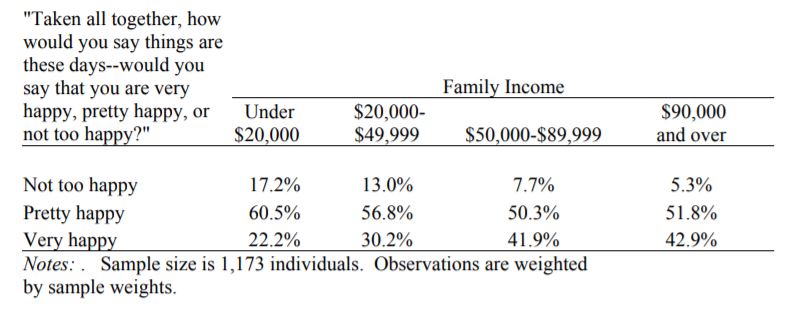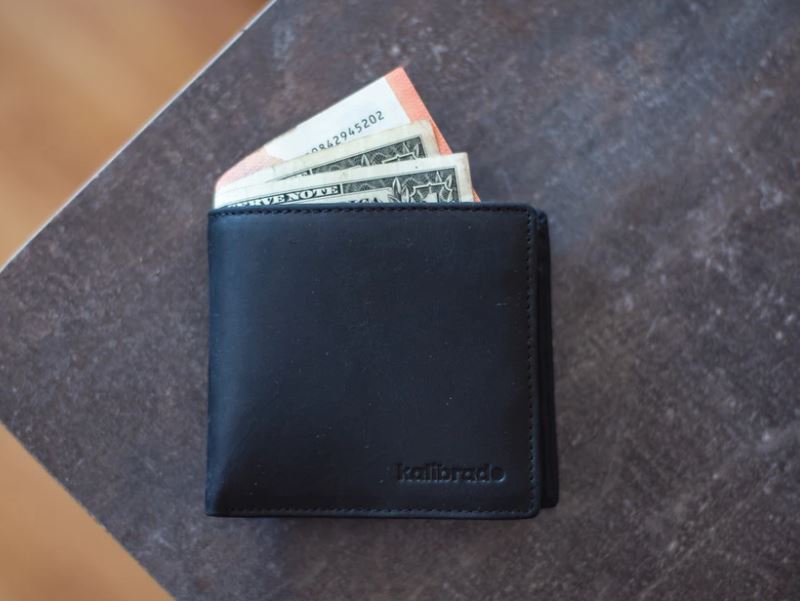We’ve all heard quotes such as “being rich won’t make you happy”. Or maybe you’ve read how poor countries aren’t necessarily less happy. This all comes down to the question of whether or not happiness can be bought. Can you buy happiness, and if so, can you make it last?
The short answer is yes, happiness can be bought, but only to a (very) limited extend. Money mostly buys you short-term happiness, while a happy and fulfilled life should also include a healthy amount of long-term happiness. If you can only feel happiness after entering your credit card details, then you got something to work on.
But that’s not the complete answer. There are some fundamentals of life that CAN be bought with money. In this article, I’ll discuss what these are using peer-reviewed studies and some clear examples of happiness that can be bought.
Contents
Can happiness be bought?
Some happiness can be bought, so yes. But that shouldn’t be the main takeaway of this article, since a lot of the happiness that money can buy is fleeting and won’t last.
There has been a lot of research on this topic already. Like we usually do here at Tracking Happiness, I’ll discuss the existing scientific findings first, before diving into the examples and how this can apply to your situation.
Studies on income vs happiness
Arguably the most often quoted study on this subject was done by Daniel Kahneman and Angus Beaton. They used data from the Gallup surveys (the same as what they use in the World Happiness Reports) combined with income data to find a correlation between salary and happiness.
The study found that emotional well-being is positively correlated to income, but the effect diminishes beyond an annual income of ~$75,000.
What can you learn from this data? In my opinion, pretty much nothing, since this doesn’t take into account additional factors like money spent, local circumstances, and age.
For example, I don’t earn $75,000 per year (I’m not even close), yet I consider myself to be very happy. I’ve tracked my income and happiness for the last 6 years, and couldn’t find any correlation between my increased income and my happiness. It turns out that this study aggregated 450,000 responses to the Gallup survey, basically throwing everything into one big pile.
Now, I’m not saying that the results aren’t interesting. I’m just saying that the $75,000 is not a number that you should value, as it doesn’t take your personal situation into account.
A much more important finding of the study is clear from the following quote:
Low income is associated both with low life evaluation and low emotional well-being.
This associating can be explained relatively easily. If you don’t have money to provide your basic means, then it can be difficult to maintain a happy and healthy life.
Another similar paper – which was also authored by Daniel Kahneman – found the same results, and presented its results quite clearly.
They asked 1,173 individuals the following question:
“Taken all together, how would you say things are these days–would you say that you are very happy, pretty happy, or not too happy?”
The answers were grouped based on different income levels:

Now, these studies only focus on income vs happiness, but a high income doesn’t necessarily mean that you actually spend the money. Let’s get back to the main question of this article. Can happiness be bought? Are there any studies that have specifically looked at the effect of spending money on happiness?
Can spending money buy you happiness?
After digging quite a bit, I found one study that is relevant to this exact question. According to this study, money can buy a little bit of happiness but only if you spend it on time-saving services. Think lawn-mowing services, meal delivery services, or paying to get your car washed.
However, does that mean that your money buys you happiness directly? Most likely not, according to the study. Instead, spending money on time-saving services results in a lower feeling of stress and more time available to do things that you like. As per the study:
People felt less end-of-day time pressure when they purchased time-saving services, which explained their improved mood that day.
Now, does that mean that money can buy you happiness directly? If you are unhappy right now, can you get happy after tactically spending a bit of money? This study doesn’t actually provide a positive answer to this question, since it can only explain an indirect correlation. Money can buy you time, and therefore, you are more relaxed and less pressured, which in turn is correlated to more happiness.
Money can buy happiness directly when you spend it on specific things
Based on years of personal finance data and my happiness journal, I actually tried to answer this question myself.
This resulted in a big personal study on how my expenses influenced my happiness. I charted all my expenses together with my daily happiness ratings, and tried to find correlations. Since I categorize all my expenses, I was able to find out which expense categories provide the biggest correlation.
Spoiler alert: I found the biggest increase in happiness ratings after spending more on holidays and experiences.
This is what I concluded after this study:
I should not feel bad for spending my money on holidays, instruments, running shoes, games or dinners with my girlfriend. Hell no! These expenses make me a happier person.
Conclusion: happiness can be bought if you spend your money wisely
With all the studies that I found while researching this topic, one thing is clear:
The statement that money can’t buy happiness is objectively false.
Every research study found a correlation between happiness and spending money (or at least having money available).
Now, the details are a little more nuanced. It’s clear that money can buy a bit of happiness, but not magically fix your unhappiness. If you’re unhappy today, money won’t directly solve your problems.
Also, spending money blindly will also not result in long-term happiness. You need to spend your money on specific things that are correlated to happiness.
What are these things? After researching the topic quite a bit, I found the following,
Things money can buy (sometimes)
There are four important things that money can buy that can actually help you build a life filled with sustainable happiness.
Of course, there are more small things that money can buy that make you happy, but I’ll put those things under the category of short-term happiness. The four things money can buy that will help you reach long-term happiness are:
- Safety
- Stability & assurance
- Comfort
- Experiences
1. Safety
This one is rather simple. Money buys you a roof above your head, the medicines that you need to stay healthy, and insurance that will pay your hospital bills when shi*t hits the fan.
This is especially true in developing nations, where safety is compromised by crime and conflicts. I experienced this first hand when I worked as an expat in Costa Rica. I worked in Limon, the 2nd largest city with (by far) the highest crime and homicide numbers in the country. I noticed right away that people spend a lot of money on providing safety for their families by means of a metal fence, a sturdy gate and barred windows.
Even though some of the houses looked quite old and unmaintained, nearly every single house still had a tall and shiny metal fence around it. Instead of spending money on luxuries and shiny cars, the Costa Ricans would rather spend it on a reliable fence, just to be safe.
Safety is correlated to happiness and living longer, so it makes sense to spend money on this category.
2. Stability & assurance
More often than not, it’s the money that we don’t spend that brings us happiness. You see, the money that we don’t spend can be saved into an emergency fund, or what is sometimes called a “f*ck you fund“.
I’m going to be honest here: the first thing I did when I landed my engineering job was to save enough money so that I wouldn’t live paycheck to paycheck. After I reached that goal, I continued to save money until I had a decent “emergency fund”, something that would last me a couple of months if the hypothetical sh*t starts hitting the fan.
Ironically enough, this is happening at this very moment, as this article will be published during the ramp-up of the COVID19 pandemic.
But why does this emergency fund make me happy? It’s not because I like staring at my bank account while imagining myself as Scrooge McDuck. No, this saved-up money makes me happy because it gives me a little bit of freedom and independence. The ability to make my own decisions without being dependent on someone else.
If you live paycheck to paycheck, then you are at risk of losing a lot of the things that make you happy when things go south. That’s how having money – by actually not spending it – can make you happier.
3. Comfort
Money can buy comfort, which in turn can help you live a more efficient and healthy life. This indirectly helps you build a life of sustainable happiness.
Now, I’m not talking about that luxury car or that big new 4K television. I’m talking about things that will improve things that are proven to be correlated to your happiness.
For example, my girlfriend and I purchased a high-quality bed when we moved into our first apartment together. It’s the most expensive piece of furniture in our apartment, but the benefits are worth much more. Sleep is extremely important and even correlated to my actual happiness. So spending money on a bed made perfect sense to us.
Some other examples:
- Better cooking utensils.
- Proper shoes, especially if you’re an athlete or walk a lot.
- Office chairs.
- Healthy food.
- Things that allow you to be more efficient at your job (a faster laptop, in my case)
- etc
Yes, you can theoretically live without these things. But having these things will most likely enable you to live a happier life.
4. Experiences
When I was 20-years old, I went skydiving for the first time. I was on the South Island of New Zealand at the time, and I had to dig deep into my wallet to find the money. However, it was money very well spend. It might have cost me over $500, but my happiness was directly improved as a result of this experience.

That’s me, falling in style!
In fact, I still experience increased happiness when I think back to this experience sometimes. Two weeks ago, I was sitting behind my laptop during a long day at the office and decided to rewatch the footage of this skydive, and I couldn’t help but smile.
It’s obvious to me that this $500 bought me happiness back then, and the experience of having skydived still makes me happy to this day.
When I shared my personal research on the effect of spending money on happiness, I received the following comment:
Looking at the few hotspots you have highlighted, I would say you are happier when you are buying memories and experiences, less when buying objects.
If you want to find a way to spend money in order to be happier, try to buy memories and experiences.
Money can buy short-term happiness
The four things we discussed in the previous chapter are all focusing on sustainable and long-term happiness.
Now, there are a lot of other things money can buy that might bring joy into your life. But a lot of these things are fleeting and only result in short-term happiness (a quick “fix” of happiness).
Think of things like:
- A night at the bar
- Drugs
- Going to the movies
- Netflix & chill
- Buying a new videogame
- Etc
These things can all make you happy, but will you remember these things in a week? If you spend an entire week enjoying yourself with an addicting videogame, will you remember that week as a happy week?
Most likely not.
Closing words
So, to come back to the main question of this article:
Can happiness be bought?
Yes, but make sure to not just spend it on things that only bring short-term happiness. That’s certainly not a good method to deal with unhappiness. Instead, try to work on other things that are lacking in your life: things that help you live a long and sustainably happy life.
Do you want to share your own stories on how you bought happiness in your life once? Do you disagree with some of the things that I wrote in this article? Did I miss an awesome tip that you used to buy happiness once? I’d love to hear in the comments below!

